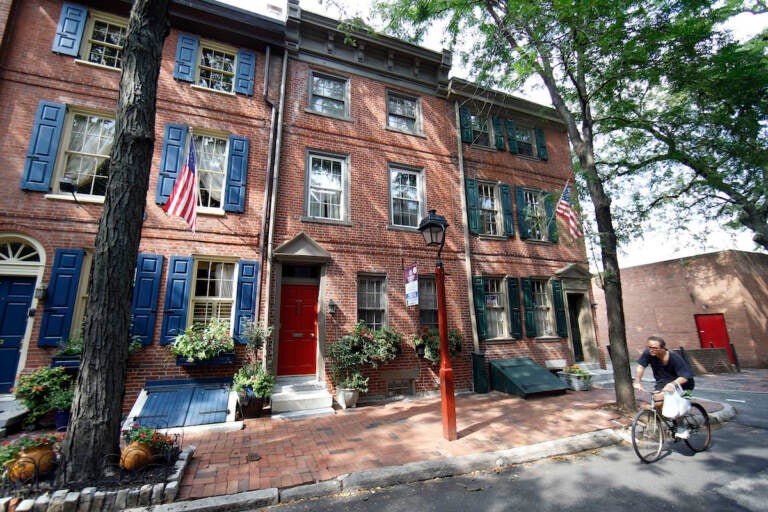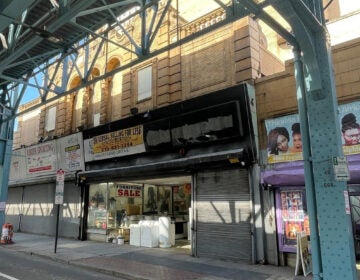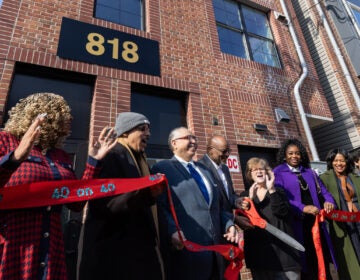What property owners, developers need to know about Philly’s new tree rules
Philly wants to increase its tree cover to 30% in 30 years. A bill passed last week creates new fees for trees that are removed and not replaced.

File photo: A rowhouse on a tree-shaded street in the Society Hill neighborhood of Philadelphia. (AP Photo/Matt Slocum)
Got a question about Philly’s neighborhoods or the systems that shape them? PlanPhilly reporters want to hear from you! Ask us a question or send us a story idea you think we should cover.
Philadelphians pushing for a greener, cooler city are cheering a bill that made it through City Council last week that could charge developers hundreds of dollars per inch of tree they remove and don’t replace.
“I think that it is a really good start,” said Gabriella Gabriel Paez, a member of the Pennsylvania Horticultural Society’s Tree Tender Community Advisory Committee and the city’s new Environmental Justice Advisory Commission. “I do not believe that it is comprehensive in terms of everything that needs to change in order to bring the city up to speed. But … something that I personally like to see is movement and action.”
The bill, sponsored by at-large Councilmember Katherine Gilmore Richardson, expands existing requirements for developers around preserving and planting trees, as well as sets up new fees for developers if they remove trees and don’t replace them. It was among dozens of measures Council passed during its last meeting before the body went on summer break — and is part of the city’s plan to increase the city’s tree cover to 30% within 30 years.
This goal requires the city to reverse the current trend. The city lost 6% of its canopy between 2008 and 2018, largely in residential areas. As of 2018, 20% of the city was covered by trees.
The city is expected to release the final draft of its Philly Tree Plan in the coming months. The plan will chart a path to preserving the city’s existing trees and planting more, particularly in the neighborhoods that need trees the most — areas with higher levels of poverty, poorer air quality, poorer mental and respiratory health, and more exposure to heat.
Disparities in tree cover currently contribute to temperature differences of up to 22 degrees Fahrenheit among Philly neighborhoods.
A draft of the tree plan released late last year recommended the city ramp up tree planting requirements for developers, and establish fees for not meeting them. It also recommended creating a tree fund, like the one Gilmore Richardson’s bill sets up, to go toward zoning code review, enforcement of new tree policies and investments in communities. Gilmore Richardson has said the revenue from the fees in her bill will go to tree plantings.
“This bill will improve PPR’s ability to implement the soon-to-be-released Philly Tree Plan, which will call for the planting and maintenance of public trees, especially in areas where tree canopy is lowest and people are most vulnerable,” said Erica Smith Fichman, the city’s Community Forestry Manager with the Department of Parks & Recreation, in an emailed statement.
Steep fees for not replacing trees
Gilmore Richardson’s bill removes some exemptions from current tree requirements — including for parks and open space — but adds an exemption for affordable housing. The bill applies only to lots larger than 5,000 square feet, like the current code.
It expands requirements for vegetated buffers between different zoning districts and adds buffer requirements along railways or major thoroughfares. It also increases planting requirements for parking lots, and requires more yard trees on multifamily residential and commercial properties.
Developers subject to the requirements must submit a landscape and tree preservation plan along with any zoning permit application, and this plan must be approved by the City Planning Commission.
Developers can apply for a waiver if they can prove that meeting the requirements are “impracticable.”
But getting a waiver means developers will also have to pay an in-lieu fee.
- For each tree waived from the buffering requirements between different zoning districts, the yard tree requirements, and the parking landscape and screening requirements: $1,000
- For other trees cleared and not replaced: fees between $50 and $400 per inch of tree width, with lower fines per inch for properties with more and bigger trees.
The waivers and fees will go into effect once the departments of Licenses and Inspections, Parks and Recreation, and the City Planning Commission certify that they’re ready to administer them — no more than 60 days after the Mayor signs the bill.
Advocates see a ‘great step’
The new tree bill is a move in the right direction, environmental justice and tree advocates say.
“I think it’s a really great step in terms of legislating and oversight for the management of our trees — and some opportunities to prioritize planting trees and greening in general,” said Kiasha Huling, who organizes tree plantings and shares tree care information with residents in the University City area as a PHS Tree Tender.
Huling is excited about the buffer requirements in the bill, and the scale of the fees.
“I think this bill is pretty savvy in looking at sizable greening opportunities,” Huling said. “Spaces in our neighborhoods that we can get a lot of trees in.”
But there are other recommendations from the draft Philly Tree Plan released last year that the bill does not address, such as cost-sharing programs between the city and homeowners for tree-related maintenance and repairs.
“When we are going around asking people to agree to tree plantings, one of their big concerns is liability related to trees,” Gabriel Paez said. “If my sidewalks are broken or if I have issues with my water line or anything like that because of the tree that was planted, I have to pay for that.”
Gabriel Paez, who has spent years planting trees and training other tree advocates in both English and Spanish in neighborhoods like Hunting Park, hopes this will not be the last piece of legislation Council passes to address barriers to having more trees in the city.
An eye on enforcement
The success of the bill will come down to how aggressively the city enforces it, Huling said.
“It’s great to have it on the books,” she said. But “what does it look like in application?”
Huling and Gabriel Paez said in their experience, the city’s enforcement of existing tree preservation requirements, such as those for specific species on a “heritage trees” list, is patchy.
“Our residents and leaders that are out there, they see these things happening every day — like a developer that doesn’t plant the amount of trees that need to be planted, according to code,” Gabriel Paez said.
Maita Soukup, Director of Communications at the city’s Department of Parks and Recreation, said in an emailed statement Tuesday that one of the goals of the tree plan was to clarify the role developers, regulators and others can play in protecting and growing the city’s tree canopy.
She said officials could not provide details yet on how city agencies plan to enforce Gilmore Richardson’s new bill, saying the city law department is still reviewing the measure and departments have not yet finished creating a plan for implementation.
Developers are also waiting to see how the city enforces the bill.
Representatives of the Building Industry Association of Philadelphia (BIA) support the bill’s intent, while noting it will “create additional steps in the permitting process.” They plan to work with the city to ensure that implementation is clear and predictable for developers.
“Thoughtful landscaping and tree canopy investment benefit everyone in the urban environment, including developers,” Mary Collins, operations manager for U.S. Construction Inc., said in a statement emailed to PlanPhilly by BIA staff. “However, critical aspects of the legislation will require new regulations for implementation, and the BIA will be working with the sponsor and city departments to ensure the future process is organized and in sync with existing permitting procedures.”
 WHYY is one of over 20 news organizations producing Broke in Philly, a collaborative reporting project on solutions to poverty and the city’s push towards economic justice. Follow us at @BrokeInPhilly.
WHYY is one of over 20 news organizations producing Broke in Philly, a collaborative reporting project on solutions to poverty and the city’s push towards economic justice. Follow us at @BrokeInPhilly. 
Subscribe to PlanPhilly
WHYY is your source for fact-based, in-depth journalism and information. As a nonprofit organization, we rely on financial support from readers like you. Please give today.









